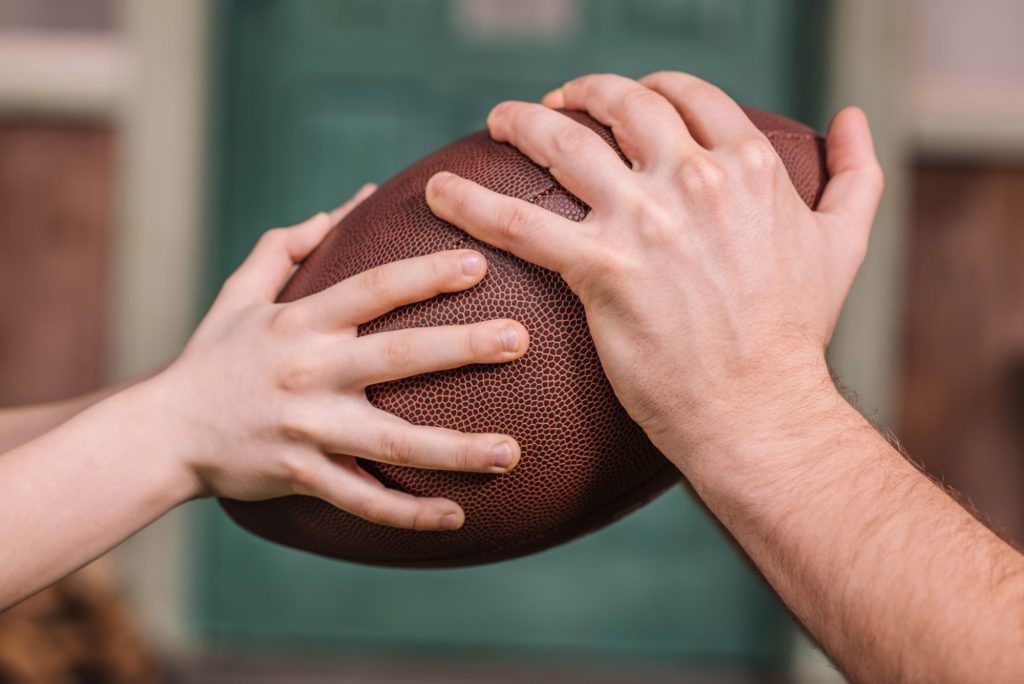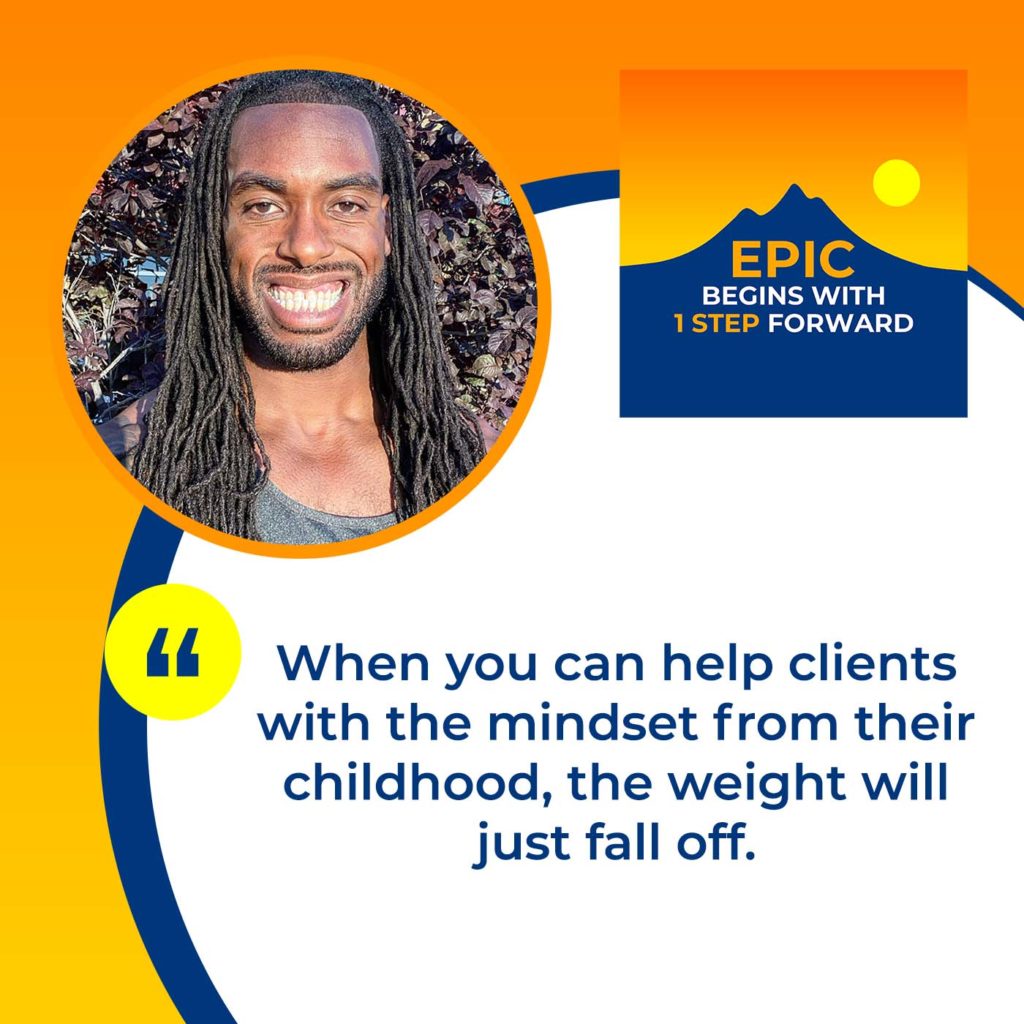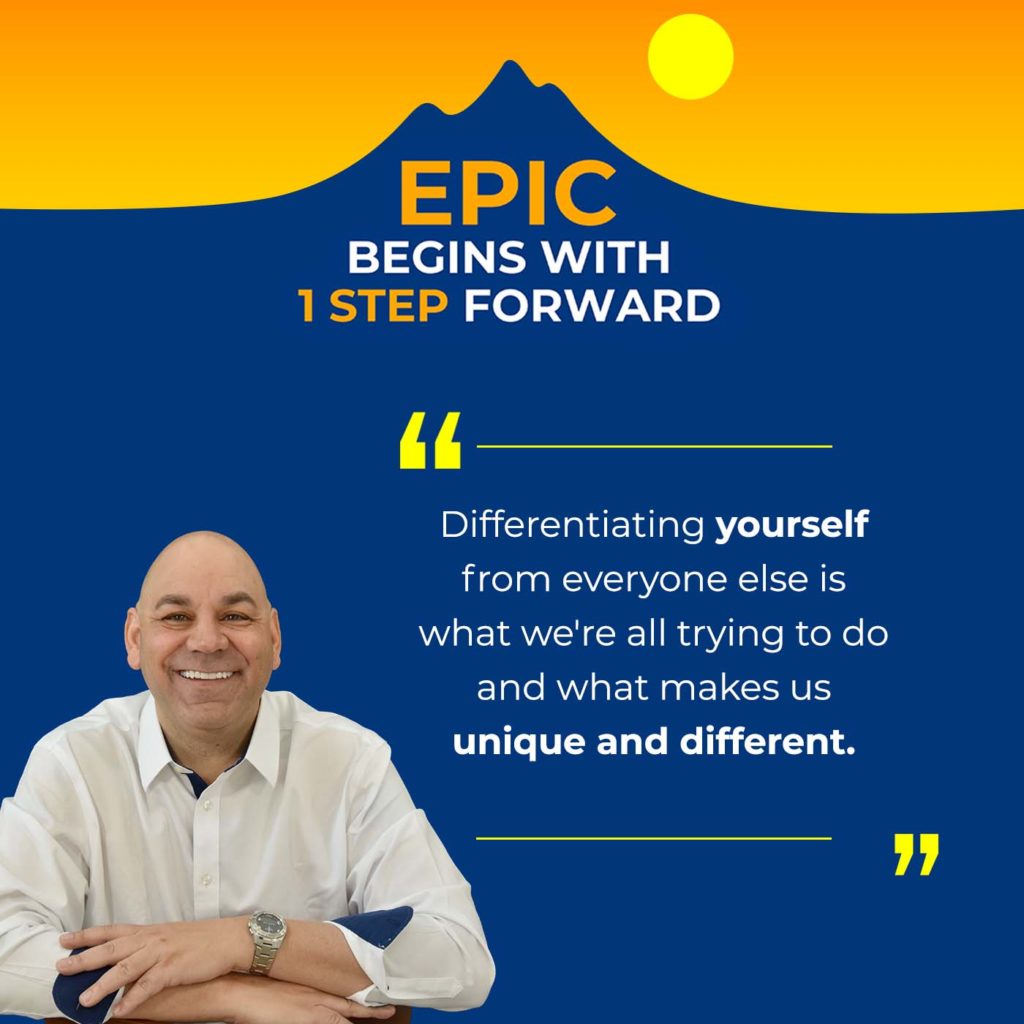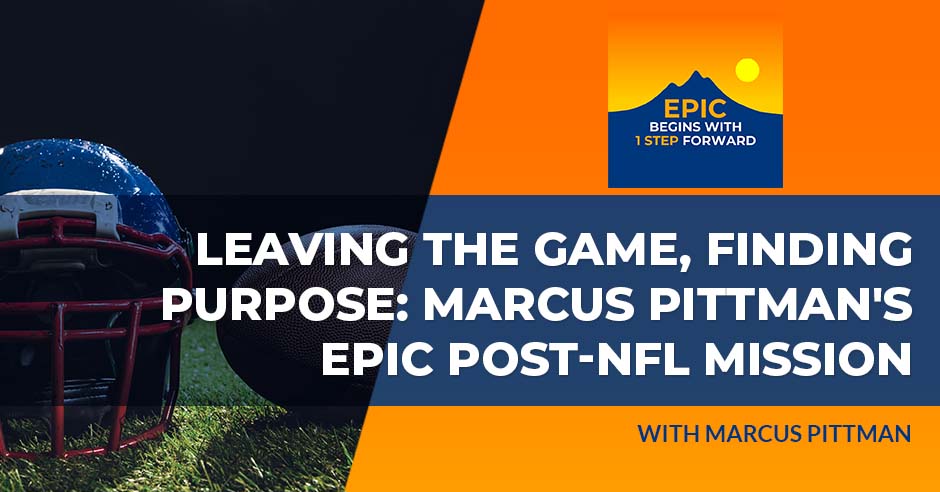—
Watch the episode here
Listen to the podcast here
Leaving The Game, Finding Purpose: Marcus Pittman’s EPIC Post-NFL Mission
I am honored to be joined by Marcus Pittman. Marcus, tell us a little about who you are.
Towards The Football Field
A little bit about me. I was born and raised in North Carolina. I’m a professional football throughout my days, and I went from personal training to a wellness specialist.
Good for you. Marcus is quite humble. If I have this correct, you played in the NFL and the Arena League.
In 2008, I played with the New Orleans Saints and then I played with the Arizona Rattlers for five years. With the Rattlers, I won three ring bowl championships in a row.
Clearly, part of my EPIC athletes, tell me a little about what it was like going to the combine when you were chosen because I have to imagine a lifelong dream and all of a sudden realize that it’s happening.

A little bit about that. Usually, the NFL combine, they put the top ten out of each position group and they send it to the combine. I got my look in my experience at my school, pro day. Every school has a school pro day, NFL Scouts and coaches can come out there, look at players, and see if they want to evaluate them and they want to, pick them if they want to dive any deeper with the player. After that draft time, I didn’t get pit, but I did sign a free agent. That’s a good thing.
You signed the free agent. You get to go to training camp. What was that like? I can only imagine that first of all, you’re like, “They want me, but I am not really sure.”
They’d rather want to see how you react to the situation as far as like, “Do you have what it takes to be on that Pacific team?” Anybody can be athletic and talented, but if they don’t have the mindset to not only carry on their role on the team, do they have the mindset to take more awareness about everything around them? Life changes when you go from a little old college player to an NFL. You are one of the top 1% of athletes that was dying to make a thing. You are the one who signed a contract. All the odds is going to be on you regardless. There were families out there I knew and sometimes we’d go out to eat and even go out to eat, I couldn’t even hide because everybody knew who I was. Stuff like that, from there, even to the barbershop. I don’t even want to talk to the barbershop because they don’t hold back at all.

Post-NFL: Anybody can be athletic and talented but not anyone can have the mindset to not only carry their role on the team but also to take more awareness about everything around them as far as life changes.
Are you saying that perhaps at times they were a little brutal?
It was like a locker room because I found this place in Metairie, Louisiana. I walked in because I thought it was a little place. I didn’t see many people there. They had like four barbers in there. I walked in, sat down, they got my ticket number, they called me up, I went in the chair and as soon as I put on the apron, he was like, “We already know who you are.” Here’s the good thing about it. They say, “Don’t worry about anything. If you don’t want to talk about football or the Saints. All you got to do is say so and we’ll respect that fully possible.” I’m like, “Okay, it doesn’t bother me.”
They’re like, “Are you sure?” As soon I say, “Yes,” here we go. They started talking crap about a bunch of players on that team that they don’t like. I’m like, “I don’t put myself into a fire hole.” It was a great experience. That wasn’t a bad experience. I have had many bad experiences except for someone trying to get my attention as far as not females, other than that, even going out, there are certain places where they see who you are, they’re like going to bat nobody would bother you and you’ll be fine. It’s a good thing because people don’t realize we’re in the spotlight for so many times. We like to have our privacy too like to have our own lives while someone buttoning into it. At the same time,0 I can’t deny a kid. If a kid wants a picture or a signature, I’ll do it.
NFL is the 1% of everyone. Aside from obviously the Superdome, what was the stadium or whatever that you went to that you were like, “I can’t believe I’m here?” If you had one.
I went to mini-count and I had no idea what was going to happen when the last day happened. As we were going through warmups, Coach Sean Payton, who now coaches with the Denver Broncos pulled me to the side and I was thinking, “What are they about to do?” He is like, “I’m going to sign you.” I was focused on trying to get everything right that day. It was surreal, but it wasn’t the stadiums because throughout college I’ve been to plenty of stadiums like Florida, Florida State, Georgia Tech, Georgia, and Nebraska. If you go to those types of atmospheres, like the college atmosphere of 100,000 plus people screaming. It’s more of an experience there as far as the NFL.
In the NFL, the experience of like, “I’m here is when I had the first actual practice, the first string.” When I’m sitting here getting off the ball, trying to get to the running back that had the ball, “Please.” Remember Reggie Bush was there. This was his first year there. I had to chase down. First of all, I had to chase down Reggie Bush, who was one the fastest humans I had ever seen. on top of that, the person I got off, he’s like 6, 7, 380 and he’s still with me and we’re downfield 10 yards.
I’m sitting here looking like, “I’m aren’t that fast.” He patted me on the back like, “Welcome to the NFL.” I was looking around like, “This isn’t 1%. Everybody is fast.” What people don’t realize is when you get to that level, everybody’s fast, strong, got some size and some unique ability in that stage. When you get there, it is all about mindset. When you’re there, you should be already ready strong, athletic, and ready to go. Now you need to learn tendencies and game plan.
I’m sure my audience is interested, what position were you playing?
I started at the end, then I played a little bit of defensive tackle in nose guard. I was all around the line. you can imagine learning positions and playing for one person. One position and you got to do all four. People don’t think a tackle and the nose guards are different because the nose guards split the line and the tackle is more on the strong side. Different tendency. Different techniques. The thing about it, people think of a playbook about that bit. The NFL is about that thick.
You have four of those because you got to know all of them for each.
Not even play chess. There’s a whole different aspect to it. People think football can’t be dumb playing the NFL or anything professional because your ability and your size can go, it can take you far, but if you can’t think and learn because when you get out there, like I said, everybody’s fast and strong. You can’t slow down. There’s no time to think. Once you hear the play, you see it. If the formation changes you got to know the chest on your own, otherwise you’re going to get left behind and you’re going to be looking bad on tape.
Here’s a question because I grew up in New England so I am a big fan of the multi-world champion New England Patriots. Did you get to play against Tom Brady and the Patriots?
I didn’t get that chance to do that, but the games I played were the Arizona Cardinals, the Cincinnati Bengals, the Miami Dolphins, and the Houston Texans. That’s the only games I played against. It is still getting on there on the field and being able to play against those guys. It’s a good experience.
Arena Football League
You went and found great success in the Arena Football League.
I was with the part of the Arizona Rattlers from 2010 to 2015. That’s when we went to four arena bowls straight and we won three. We lost our first one by two points.
That’s a heartbreaker.
The same thing about that one was we should have won, they called a flag for roughing the passer because the quarterback, when he threw the ball, dipped his head down to look like I hit him in the head and he got rushing to pass him on me. After that, the defense wasn’t ready and they scored on us that next play with two seconds left. For that, it is no good learning experience. It’s like you can go far and if you get off track once, you can lose everything.
You can go so far but if you get off track once, you can just lose everything.
As a lifelong Red Sox fan, painful as it is for me to reference Bill Buckner in 1986. There we are one strike away from finally winning the World Series. One literally one second of inattention what should have been an honest routine like Little League put your a ground ball, put your glove down, get it in your glove, step on the bag and it goes through his legs. No matter what level you’re at, you don’t have to be a professional athlete in your life. You work hard, you get this close to whatever your goal is and sometimes it does slip through your fingers.
Hanging Up The Cleats
Nowadays you’ve retired, but you are a very successful entrepreneur, you’ve been a personal trainer, you’re doing wellness. I follow you on Instagram. We’ll get that at the end for people who want to follow you. You are inspirational. How was that transition from your job to being an athlete, and then all of a sudden this thing that you’ve done for, I’m going to guess, at least 10 to 15 years of your life, all of a sudden it’s done.
The part of not playing football anymore was not even the biggest challenge because I retired on my own terms because I went through all the championships. I have five total championships. 2 in college and 3 with the Rattlers. I was at a point where I was doing it for fun and our team called it interception. I went for a routine block and hit. When I hit someone it felt different like my eye literally froze and couldn’t move anything for 5 or 6 seconds, then once everything started coming back I was like, “I’m done. I got five rings on my belt. I played enough. What do I need to play for? There’s no point.”
That’s the line that people fall in because there are times and places where you can go on, then once you start feeling a little different, that’s when it’s time to hang it up. The football part was easy because I was successful. I didn’t have anything else to go for. I mean other than personal goals. At the same time, I had to take care of my body because I had kids. I have a daughter and two boys. I’ll at least like to be able to have the functional capability to be around them or talk to them unlike what you heard as far as some other athletes that went a little bit too long.
The hard part of football is everybody around you because when everybody loves you, everybody wants to see you, everything when you have the helmet on, but as soon as you hang up the helmet and the cleats, that’s when people start disappearing because you start to realize a lot of people in your life are in your life because of their reasons not for you. They’re only there for their entertainment and once you start entertaining them, then they go away.
How was that for you?
There’s not anything out there to help with athletes like that. Not because not only like you lose the people that you talk to and get to go into the real world. The majority of people will look at you like you’re crazy because of what you have done to get you where you are. Automatically you look like the odd person out in a lot of places. Your work, mindset, and work ethic look extreme to a lot of people around the world compared to going, and walking into that locker room because in that locker room, you’re surrounded by dudes that’s trying to get that same goal. They’re trying to stay on the team. They’re trying to have a good livelihood. They want to play football.
What I can imagine is a for right or wrong, big part of your identity is, “I’m a professional athlete,” by choice or not by choice, but when that ends, I would imagine that time that there’s a bit of an identity crisis, like, “This huge part of how I saw myself in the world sees me is no longer an active part of my life. Who am I? How is the world seeing me?” I’ve heard from other professional athletes who once they’ve retired, said, “There were lots of people around me, and all of a sudden when I wasn’t playing, some of those people weren’t around anymore,” then you realize that maybe there were more Fairweather friends or whatever.
Like a celebrity. When they stop making movies, people forget about them. There are certain people that don’t forget you because they’re the true people. There are some people throughout my career who still follow what I do because I went from more of an entertainment business to health and wellness, medical more helping people because I worked out all the time and people were like, “How you can stay fit? Why don’t you start helping people?”
That’s why I switched my mindset to trying to save that daily crisis level to helping people. I retired in 2016 and where I am now, in 2024 a wellness specialist. Not only do I do personal training, I also do nutrition, health and wellness, mindset training, and “rehabilitation.” I look at a client as a whole, like their faults because weight is the underlying injury, the mindset of childhood that is what brought them to where they are now when you can help them with those areas, the weight will fall off.

I want to let my audience know that at least from some of the Instagram where I see him in the gym, Marcus has not lost a step. The man is still ripped. I see workouts that he is doing and I get tired. I have to go take a nap.
I’m in a lot better shape now than I did playing ball because playing ball, I was like playing weight 285. but I also have four surgeries on me. That’s what prompted the whole personal training because, for my fourth surgery, I weighed about 317 at that time. My back gave out during my last season and that’s when I was starting to break like, “Why do I keep getting injured? I’m pending surgery on my foot. Now my back is getting out. There’s got to be a problem.” That’s when I started addressing my health and weight. I found out I was pre-diabetic at that time too, which in case most athletes, are pre-diabetic because of the upbringing of what we’ve been doing and the high level of like we used to drink Gatorade all the time.
The mass amount of carbs you’re taking in.
Especially around training count, if you weren’t eating almost 8,000 calories, you’re going to lose weight you can’t lose weight because if you are 4 or 5 pounds under the weight you were supposed to for your position, you get fined $800 a pound. If you are overweight by 4, it was more. Mindset-wise, you have to keep your body right. You had to literally live, eat, and breathe football. That’s the problem when we stopped football then all those activities we don’t do anymore our bodies are in tune with the athletic lifestyle and that’s when it started breaking down. that’s why I tuned in to my food. The workout got more technical and more precise and I went from 317 to 223 in a year and a half.
I should also point out that I’ve met Marcus in person. Marcus is very tall. What are you? 6’5?
Yes, 6’5.
I’m 6’2 and normally people are like, “You’re tall.” I was standing next to Marcus, I’m like, “No.”
It’s incredible. You had your epic football journey. You seem to have shifted yourself well and are doing fantastic things to help people. What motivates you to keep taking those steps forward?
Marcus’ Motivations
What motivates me is looking at the places that people are overlooking and trying to capitalize on them. When I started personal training that worked for a little bit but I wasn’t getting the revenue that I thought because I taught it in a different way. I was surrounded by very good teachers and mentors who taught me the right way to do health. I was already at a good advantage with it. When I started to notice this, there were a lot of key things missing because there are a lot of people who don’t want to work out because they either hurt themselves or they don’t want to hurt themselves again.

Post-NFL: What motivates me is looking at the places that people are overlooking and trying to capitalize on it.
There have been people that’s been around trainers that have had a trainer that every time they go to somebody they getting hurt or not getting results. 2) I started looking at the field and there is a very big saturation of trainers. I wanted to be somebody different because growing up football made me different. I can’t be someone that’s different and try to put myself in the area where everybody else is at.
Differentiating yourself from everyone else is what we’re all trying to do and, “What makes me unique, what makes me different? What do I have to offer that the guy next to me isn’t offering?” You seem to have dialed that in well.

Some of it was not by choice, but then some of it was more realization because I didn’t change my method of health and wellness until there was a time. I’m pretty sure I told you you heard about this story about my son. I was in the process of thinking about it and then I received a call from his mother and she told me that his arms weren’t moving. I’m thinking maybe he hit himself an arm and he had a stinger or slept wrong because if you see, he likes to sleep wild. Sometimes like when you in a different position, you’ll pinch a nerve and things start going numb.
About 2 to 3 hours later after she went to the hospital, she was like, “Arm’s still not moving.” That’s when I was like, “Let me go there.” This was during 2021. COVID rules, you couldn’t have two parents in the hospital unless they were in a room. I had to sit there for 4 to 5 hours outside waiting to figure out what was going on. Each hour went by, and she texted me, “Now his left leg not moving. Now his right leg is barely moving.” His right leg started not moving then his left leg was starting to not move too. I was already in that approach. I know a lot of people in the medical field. Instead of waiting, I went and called a few people, told them the symptoms, tell them what was going on.
Within ten minutes they told me, they lookout that it might be either acute flaccid myelitis or the autoimmune version. I pray it won’t be autoimmune. When I got to the room, that’s when I had an idea. Even nurse A was like, “I’ve seen this too many times. I’m confident that this is acute flaccid myelitis,” and according to her peers the best thing to do is therapy and they’re correct. The best thing you can do is therapy. My fiance is a physical therapist. She gave me a lot of insight into little things where we can do. That next morning we got up like, “Let’s try to walk, move, and get something going.”
Dealing with sickness like that, first of all, acute flaccid myelitis was founded in 2012 and according to the records, he would be case number 651 in the world that contracted this virus. As far as neural doctors or anything, they spent days trying to figure out if he even had that or not. I went ahead and went to the assumption that that’s what it is because the symptoms were too close. I had doctors who were like, “He’ll probably start walking in three months.” As a father, that’s unacceptable and I’m going to do my best to try to get him going sooner than that.
Honestly, it took eight days. It started getting better over time, but then that eighth day he started walking on his own. That Saturday they came in and did it normally. We doing more, running more tests, trying to figure it out I literally put a video up and like, “He’s walking.” They stopped looked at each other and like, “In that case let’s discharge him downstairs to physical therapy. He’s been doing physical therapy 3 times a day for the next 2 weeks.” It took another week and he walked himself out to there. Well
That’s awesome. That is truly an epic story.
Since then, it took 3 or 4 months for him to finally get normal-ish. Now he is still 90% to 99% because he’s as happy wildly everything. When he gets tired, some of the lingering symptoms start showing a little bit. He drafts his left leg a little bit. If he’s playing sports or doing anything else, you can honestly not tell. After that, that’s when I thought about it, it’s like there are a lot of people that are dealing with viruses like this or some other illnesses cerebral palsy, autism, or anything that will deteriorate a person’s body. Why not help those people? I have another kid, his name is Christian. He had acute flaccid myelitis himself and he had it many years ago.
He went through a time where he couldn’t even move his arm and now he can give people high fives. It’s not as strong as I liked it to be. After a year of working with him, he finally gave able know high five, somebody with his right arm after not wounded for six years. Another client of mine, Victor, has cerebral palsy. He couldn’t stand up straight or walk normally. It took a month and a half for him to start walking straight and also pull something from his legs. That type of approach brings more joy because you give someone that was been told numerous times that, “You’re not going to get better. There’s nothing we can do.” You got parents taking Christian to Stanford and getting denied to LA or Boston. It shows that there are people out there who are willing to not give up on your people if others don’t. That’s what I stand for.
It’s very inspiring. Marcus, thank you so much for sharing and that is our time. I want to thank you for joining us and sharing all of these epic stories. I want to remind everyone, you can go to EpicBegins.com to find everything epic. If you’re reading this and you are interested in doing a little course of your own, I have some courses up on my website. If you put in the coupon code, EPIC BEGINS, you’ll get $50 off each of those courses. Marcus, thank you so much. I hope that you have a great rest of your day. I look forward to talking to you again soon.
I would love to do that. We can go dig deeper into health and wellness for everybody. Thank you very much.
You bet.
Important Links
- Marcus Pittman – Instagram
About Marcus Pittman
 Marcus Pittman, a former NFL player and now a wellness specialist coach, brings a wealth of experience and expertise to his clients. With a strong background in professional athletics, Marcus understands the demands of high-performance sports and the importance of physical well-being. His years on the field have given him unique insights into the body’s capabilities and limitations, allowing him to design personalized training programs tailored to individuals’ specific needs. Beyond physical fitness, Marcus also focuses on mental and emotional well-being, recognizing that true wellness encompasses all aspects of our lives. With his supportive and motivational coaching style, Marcus empowers his clients to achieve their health and wellness goals, helping them lead happier, more fulfilling lives both on and off the field.
Marcus Pittman, a former NFL player and now a wellness specialist coach, brings a wealth of experience and expertise to his clients. With a strong background in professional athletics, Marcus understands the demands of high-performance sports and the importance of physical well-being. His years on the field have given him unique insights into the body’s capabilities and limitations, allowing him to design personalized training programs tailored to individuals’ specific needs. Beyond physical fitness, Marcus also focuses on mental and emotional well-being, recognizing that true wellness encompasses all aspects of our lives. With his supportive and motivational coaching style, Marcus empowers his clients to achieve their health and wellness goals, helping them lead happier, more fulfilling lives both on and off the field.

